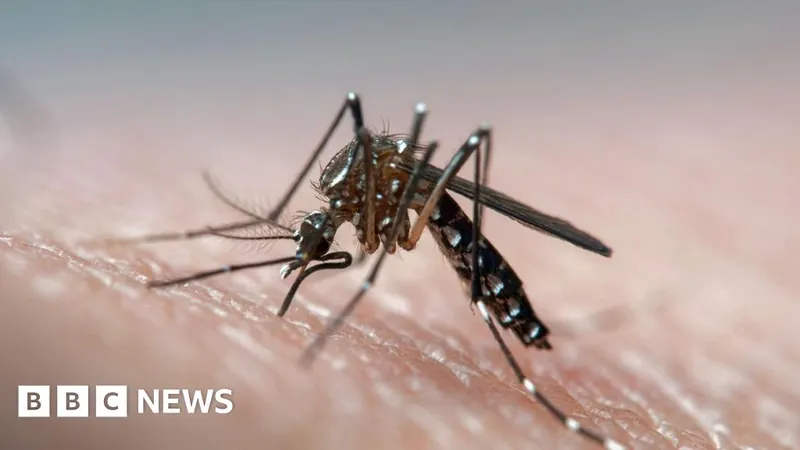
Revolutionary Strategy to Combat Dengue: Deafening Male Mosquitoes to Curb Breeding!
2024-11-05
Author: Jacob
Groundbreaking Study Reveals Innovative Method
In a groundbreaking study, scientists have discovered an innovative method to tackle mosquito-borne diseases, including the dreaded dengue, Zika, and yellow fever, by rendering male mosquitoes deaf. This unique approach hinders their ability to mate, significantly reducing their population and subsequent disease transmission.
Importance of Sound in Mosquito Mating
Mosquitoes engage in mid-air mating, where the males rely heavily on their acute hearing to locate females by recognizing the rhythmic wingbeats that signal an inviting companion. In this promising research, conducted by a team at the University of California, Irvine, researchers ingeniously altered a genetic pathway in male Aedes aegypti mosquitoes, the species notorious for spreading viruses to over 400 million people annually.
Results of the Genetic Modification
The scientific team observed that the modified male mosquitoes failed to respond to mating calls even after being confined with female mosquitoes for up to three days. By targeting a critical protein, trpVa, known for its role in sound perception, they effectively silenced the males. Consequently, these "deaf" mosquitoes were unable to engage with females, while their wild counterparts readily mated, fertilizing nearly every female in their vicinity.
Publication and Expert Insight
Published in the prestigious journal PNAS, the findings underscore the precision of this genetic modification, as the mating success of the deaf males was completely nonexistent—creating a dramatic shift in the dynamics of mosquito reproduction. Dr. Joerg Albert, an esteemed expert on mosquito mating from the University of Oldenburg in Germany, emphasized the potential of this approach. He stated, "This research highlights sound as a critical factor in mosquito reproduction. If males lose their ability to hear, we could see a significant decline in female populations, potentially driving them towards extinction."
Ecological Considerations
Despite these intriguing results, experts caution that while mosquitoes are vectors for diseases, they also play vital roles in ecosystems, serving as crucial food sources for various wildlife, including fish, birds, bats, and frogs, and contributing to pollination efforts.
Future Strategies
In addition to this auditory attack on mosquito reproduction, other strategies are under consideration, such as the release of sterile males in regions plagued by mosquito-borne diseases. As scientists continue to explore comprehensive methods to control mosquito populations, this novel research opens a new frontier in our fight against these persistent and dangerous insects.
Conclusion
Could this ingenious genetic breakthrough truly hold the key to eradicating dengue and other mosquito-borne illnesses? Only time will tell, but the future of public health might just be a little quieter!









 Brasil (PT)
Brasil (PT)
 Canada (EN)
Canada (EN)
 Chile (ES)
Chile (ES)
 España (ES)
España (ES)
 France (FR)
France (FR)
 Hong Kong (EN)
Hong Kong (EN)
 Italia (IT)
Italia (IT)
 日本 (JA)
日本 (JA)
 Magyarország (HU)
Magyarország (HU)
 Norge (NO)
Norge (NO)
 Polska (PL)
Polska (PL)
 Schweiz (DE)
Schweiz (DE)
 Singapore (EN)
Singapore (EN)
 Sverige (SV)
Sverige (SV)
 Suomi (FI)
Suomi (FI)
 Türkiye (TR)
Türkiye (TR)